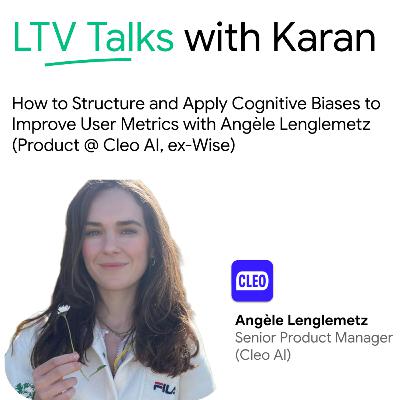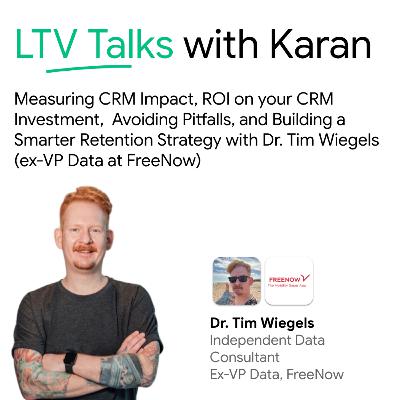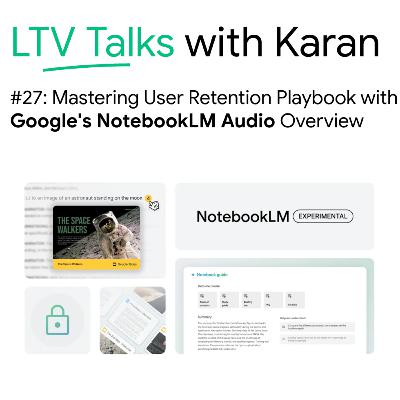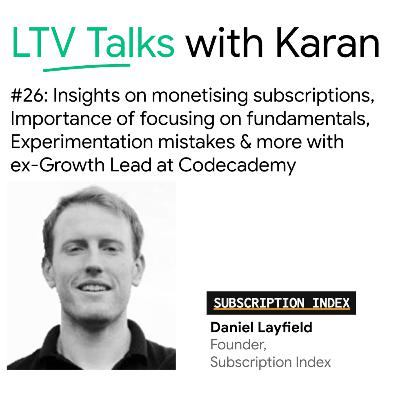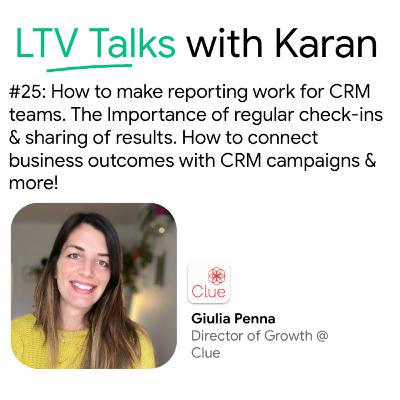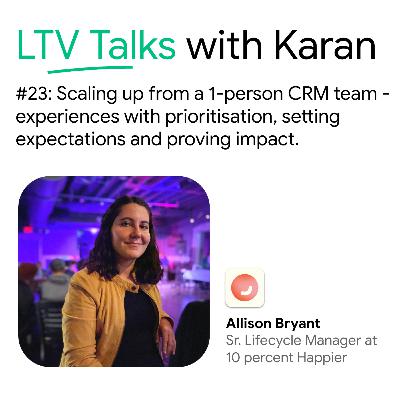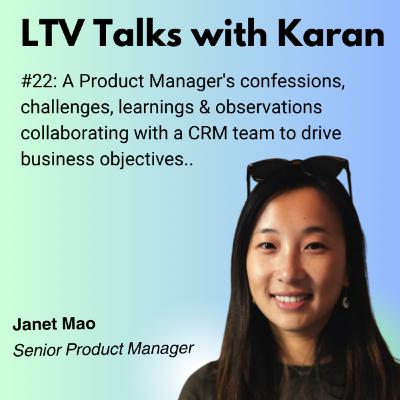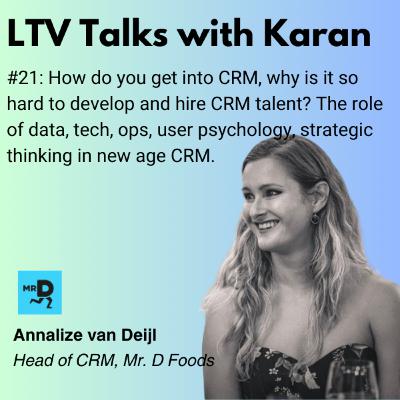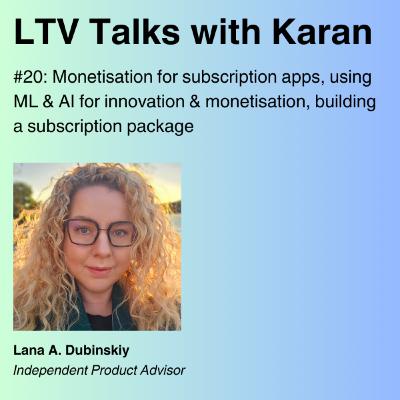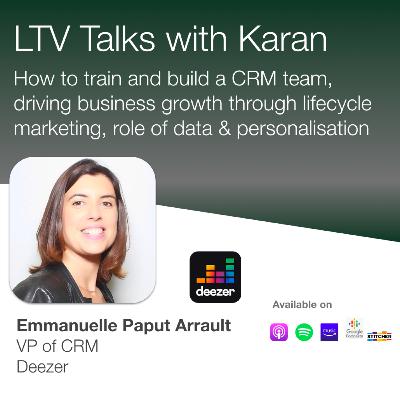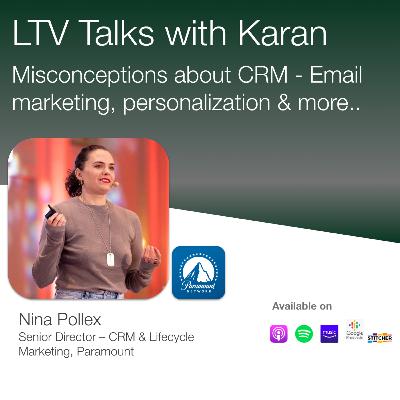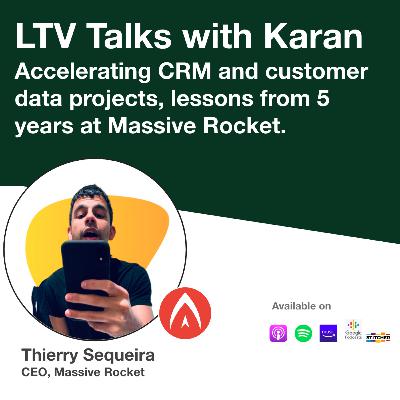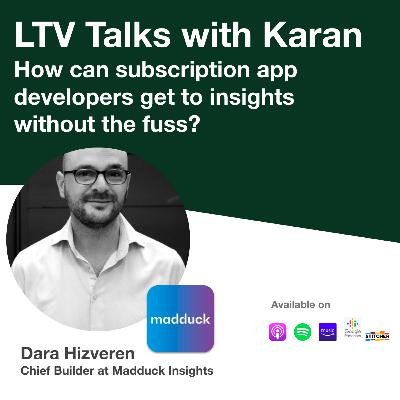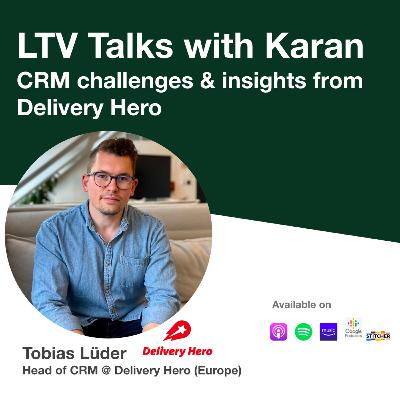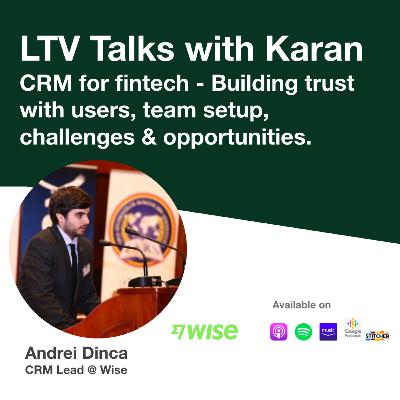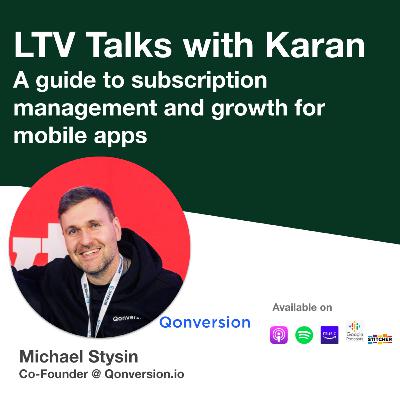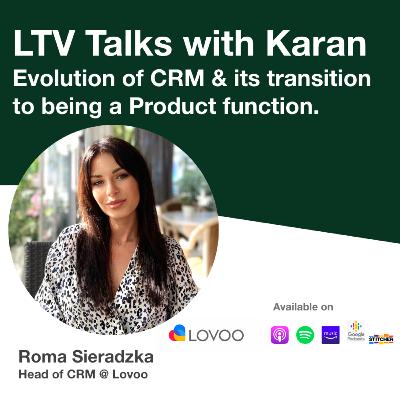Discover LTV Talks with Karan
LTV Talks with Karan

LTV Talks with Karan
Author: Karan Tibdewal
Subscribed: 3Played: 54Subscribe
Share
© Karan Tibdewal
Description
Welcome to LTV Talks with Karan, the podcast where I explore the world of m-CRM, Growth via engagement, and Subscriptions. Join me, Karan Tibdewal, a Growth & Retention consultant who has worked with world-leading apps like Blinkist, Soundcloud, Headspace, etc., as I interview experts to learn from their experiences. From discussing how to use AI & machine learning to optimize your push notification strategy to sharing insights on how to think like a subscription conversion consultant, we dive deep into their experiences, strategies and tactics that can help apps increase their customer LTV.
32 Episodes
Reverse
Cognitive biases shape how users make decisions, but how do you apply them strategically in product, CRM, and growth—without relying on gimmicks? How do you choose and prioritise which biases can help your users?In this episode of LTV Talks, I sit down with Angele Lenglemetz, Senior Product Manager at Cleo AI, to explore the right (and wrong) ways to use cognitive biases in your work. Angele shares how she evolved from using psychological tricks as quick wins to systematically integrating behavioral science into product strategy.We cover:✅ How to choose the right cognitive bias for the right problem✅ Why loss aversion, anchoring, and social proof work—and when they don’t✅ How Cleo applied biases in financial behavior change (and what backfired)✅ The 3B framework for systematically applying biases to product & CRM✅ When overusing biases hurts trust and long-term retentionWhether you’re a product manager, lifecycle marketer, or growth expert, this episode will give you a clearer, more structured approach to applying behavioral science in your daily work.
In this conversation, I speak with Dr. Tim Wiegels explore the intricacies of CRM data, focusing on effective measurement strategies, common pitfalls in CRM teams, and the importance of understanding the broader business context.Tim shares his journey from academia to data leadership, emphasizing the need for CRM teams to align their metrics with overall business goals and to avoid siloed thinking. The discussion also touches on the challenges of managing control groups and the potential overload of CRM tools, advocating for a more strategic approach to data utilization.In this conversation, wel discuss the challenges and strategies surrounding CRM tools, customer data management, and the importance of understanding customer lifetime value. The emphasis for teams to define their strategies, leverage AI for data analysis, and focus on retention in the evolving landscape of marketing.The discussion also highlights the significance of data literacy and the future of CRM in a data-driven world.takeawaysUnderstanding ROI on CRM tools is crucial.Teams often focus too narrowly on their KPIs.A holistic view of the funnel is essential.Vouchers can lead to revenue loss if mismanaged.CRM goals should align with overall business objectives.Control groups need regular refreshing to remain valid.Data teams must communicate effectively with management.Incrementality and uplift modeling are key measurement strategies.Headspace is necessary for effective data analysis.Freelancing allows for more focused project work. CRM teams often rely too heavily on tools without understanding their full capabilities.It's crucial to segment customer data effectively to drive better marketing strategies.Defining a clear strategy is essential for CRM teams to succeed.Customer lifetime value is complex and requires a deep understanding of customer behavior.AI can significantly enhance data analysis and decision-making processes.Teams should focus on retention strategies as acquisition becomes more challenging.Data literacy is vital for marketing teams to manipulate and understand data effectively.Using AI tools can streamline processes and improve efficiency in data handling.Understanding the value segments of customers can help in targeted marketing efforts.Effective communication and collaboration between teams are key to successful CRM implementation.Tim's Linkedin: https://www.linkedin.com/in/timwiegels/Tim's Podcast: https://tr.ee/DCtUqUirY_Enjoy this conversation!
Summary
In this conversation, I interview Sundar Swaminathan, a marketing data science leader, about his journey from software development to B2C marketing analytics.
Sundar shares insights from his time at Uber, emphasizing the importance of a data-driven culture and psychological safety in fostering innovation.
We discuss the challenges of lifecycle marketing, the significance of personalization, and strategies for maximizing impact while minimizing effort. The conversation highlights the need for clear lifecycle definitions and the role of leadership in creating an environment conducive to data-driven decision-making.
In this conversation, Sundar and I delve into the intricacies of personalization in marketing, discussing its varying importance across different industries. We also explore the strategic use of discounts and promotions to enhance user engagement, emphasizing the need for A/B testing to validate marketing strategies. Sundar shares insights on overcoming barriers to experimentation, highlighting the human factors that often hinder progress. The discussion also covers the significance of strategic measurement in marketing efforts, particularly the use of health metrics to gauge business performance effectively.
Chapters
00:00 Introduction to Sundar Swaminathan
07:56 Creating Psychological Safety in Data-Driven Environments
13:55 Understanding Lifecycle Marketing and Its Importance
29:01 Maximizing Impact through Effective Personalization
35:03 Leveraging Discounts and Promotions for User Engagement
40:40 Overcoming Barriers to Experimentation
49:10 Strategic Measurement in Marketing
55:32 Understanding Health Metrics for Business Success
Keywords
B2C marketing, data science, marketing analytics, psychological safety, lifecycle marketing, personalization, Uber, data-driven culture, experimentation, marketing strategies, personalization, marketing, A/B testing, user engagement, measurement, health metrics, lifecycle marketing, discounts, experimentation, data science
SummaryIn this conversation, we explore the intricate relationship between content creation and branding. We discuss how and what can brands learn from successful content creators, the importance of understanding user personas, and the role of tone of voice in building brand loyalty. Ines shares her journey from academia to the creator economy, emphasizing the need for a consistent brand voice and the potential of AI tools in content marketing. The discussion highlights the significance of distilling complex ideas into engaging content and the future of content creation in a competitive landscape.Key Takeaways from our chat:Creators often treat content as a product.Brands can learn a lot from content creators.Understanding user personas is crucial for effective content.Tone of voice significantly impacts brand perception.Scaling content requires a consistent brand voice.The process of distilling complex ideas is vital for engagement.AI tools can enhance content creation and marketing strategies.A strong brand identity can differentiate in a competitive market.Content should resonate with the audience's needs and emotions.Chapters00:00 The Intersection of Brands and Content Creation02:37 Ines Lee's Journey from Academia to Content Creation05:36 The Skills that Attracted Ali Abdaal08:05 Distilling Complex Ideas into Engaging Content10:44 Understanding User Personas and Problem Statements13:31 Mapping Content to User Goals16:14 The Importance of Brand Voice18:48 Exploring Brand Personalities and Their Impact21:31 The Role of Trust and Loyalty in Branding23:56 Methods for Establishing a Brand Voice28:03 The Power of Brand Voice in Consumer Loyalty30:57 Testing Tone of Voice for User Engagement32:54 Personalization in Brand Communication36:32 Scaling Brand Voice Across Teams40:27 Translating Brand Voice into Content Formats47:21 The Future of Content and Brand Identity
This episode explores how AI data agents promise to unlock speed, autonomy, and strategic clarity that lifecycle marketing teams have been waiting for — by removing their biggest blocker: access to usable, contextual data.Through a conversation with Ishan Rakshit (Co-founder @ Sortment), we dive into how AI is shifting from being a creative assistant to becoming a deeply integrated data teammate — helping CRM teams move from ticket requests to instant, insight-driven execution.I honestly feel this is one of the most insightful episode of my podcast so far. Some of the key topics we discussed here: Why does personalization still feel broken in 2025?: A honest look at why lifecycle marketing hasn’t evolved fast enough — and what’s kept us stuck.How AI is changing the way CRM professionals think — not just how fast they move. What are the AI native use-cases for lifecycle marketers?: Things that weren't possible until we had this technology. AI enables teams to ask more questions, explore more strategies, and think out loud without friction.What can an AI data agent actually do?: Real examples: from asking vague brainstorming prompts to deploying live segments into your ESP — in minutes, not weeks.Why the future marketing tech stack will be built around your data warehouse — not your ESP": A must-hear for Heads of CRM and Growth Leaders thinking about the next 12–24 months of their CRM & Martech tooling."How to get your team (and data team) ready for AI-first workflows": Tangible advice on change management, adoption blockers, and the mindset shifts required to truly benefit from AI tools.You can check out Sortment here.
Here's an experimental podcast episode, created entirely by Google's NotebookLM. When I was starting out, this playbook from Amplitude was the most helpful resource that I found, studied and applied as cleanly as possible. It's a comprehensive guide to mastering user retention, which is crucial for achieving sustainable product growth.
The playbook emphasises that retaining existing users is as important as acquiring new ones, and that focusing on retention impacts all critical business metrics. The central theme is the Retention Lifecycle Framework, which categorises users into four stages: New Users, Current Users, Resurrected Users, and Dormant Users. This framework facilitates tailored retention strategies for each user group, focusing on shifting the retention curve up by improving the new user experience and flattening the curve by nurturing long-term user engagement. The playbook outlines specific steps for analysing user behaviour in each stage, including identifying behavioral personas, and using various product analysis tools like cohort analysis, funnel analysis, stickiness analysis, and session metrics, to gain insights into user actions and drivers of retention. It emphasises the importance of experimentation and iterative improvements, providing practical examples and recommendations for implementing strategies to enhance user retention throughout the lifecycle. The playbook concludes by highlighting the importance of setting concrete retention goals, monitoring key metrics, and prioritising experiments for continuous growth.
In this conversation, Daniel Layfield, former Growth Lead at Code Academy & founder of Subscription Index shares insights on monetizing subscription businesses. He discusses his transition from JP Morgan to Code Academy and the challenges of transitioning to a subscription model.
Daniel emphasizes the importance of focusing on the fundamentals of pricing, paywalls, checkout pages, and churn tactics. He also highlights the significance of metrics and data analysis in optimizing monetization. Additionally, Daniel discusses team structures, the balance between speed and accuracy in product development, and the impact of unnecessary complexity on velocity. The conversation covers topics such as planning for success and maintenance, A/B testing and experimentation, trends and opportunities in 2024, and increasing LTV through pricing.
Takeaways
Startups should plan for the scenario where they are successful and need to maintain their systems.
A/B testing should be used selectively and only for complex changes or high-risk areas.
In 2024, big companies are focusing on profitability and finding ways to generate more revenue from each account.
There is a gap at the bottom of the market for B2B SaaS tools, creating opportunities for newer companies.
Raising prices and removing free trials are strategies to increase LTV.
Chapters
00:00 Introduction and Background
01:10 Transition from JP Morgan to Code Academy
03:05 Joining Code Academy and Focus on Monetization
05:10 Challenges of Transitioning to a Subscription Model
08:45 Team Structure and Challenges in Subscription Growth
10:35 Importance of Fundamentals in Subscription Business
13:35 Churn Tactics and Payment Processing
19:49 Common Pitfalls in Subscription Monetization
24:55 Importance of Metrics and Data Analysis
26:36 Team Setups and Organization Structures
34:01 The Importance of Speed in Product Development
37:13 Balancing Speed and Accuracy
38:19 Planning for Success and Maintenance
39:13 A/B Testing and Experimentation
44:02 Trends and Opportunities in 2024
45:28 Increasing LTV through Pricing
Giulia Penna, Director of Growth at Clue, discusses the topic of reporting in CRM teams and organisations. She shares her career progression, from working in startups to becoming a freelancer before joining Clue.
Giulia highlights the importance of reporting in CRM and the challenges she faced when she joined the company. She emphasizes the need for structure, planning, and reliable reporting to measure the impact of CRM campaigns.
We also discussed the evolution of CRM and the changing expectations in reporting and attribution. In this conversation, Giulia discusses the importance of clear communication and oversharing in a team, as well as the value of repetition and making information easily accessible.
She emphasizes the need for trust in reporting and the importance of having confidence in the numbers being shared. Giulia also discusses the balance between using existing reporting tools and working with the data team to improve reporting accuracy. She highlights the need for reporting to focus on company metrics and the impact of campaigns, rather than just campaign-level metrics.
Additionally, Giulia touches on the role of a CRM manager in clear communication, recognition of team efforts, and the evolving nature of reporting with the integration of AI tools.
I hope you enjoy the episode!
Summary
In this episode, I interview Allison Bryant, a senior lifecycle marketer at 10 percent Happier.
Allison shares her experience of starting a team from scratch and building marketing infrastructure for the company's growth. She emphasizes the importance of understanding the customer journey and collaborating with other teams. Allison also discusses the role of CRM as a force multiplier and the need for prioritization in driving impactful initiatives.
In this conversation, Allison discusses various strategies and tactics for increasing engagement and preventing churn in a meditation app. She shares insights on the power of re-engagement campaigns, the effectiveness of rerunning challenges, and the importance of repetition in messaging. Allison also explores the use of AI and LLMs for copywriting and highlights the proactive approach to churn prevention. She emphasizes the strategic role of lifecycle marketing in driving LTV growth and offers advice for founders and teams looking to optimize their CRM efforts.
Takeaways
Starting a team from scratch requires understanding the customer journey and collaborating with other teams.
CRM is a force multiplier that can significantly impact growth and retention.
Prioritization is crucial in maximizing the impact of CRM initiatives.
User insights are key in driving impactful initiatives and optimizing the customer journey. Reengagement campaigns can be highly effective in increasing engagement and preventing churn.
Rerunning challenges and courses can provide valuable re-engagement opportunities for users.
Repetition is key in messaging, as people often need to hear things multiple times in different ways to break through.
AI and LLMs can be powerful tools for copywriting and personalization in CRM efforts.
Proactive churn prevention strategies, such as re-engagement campaigns before renewal, can significantly impact retention.
Lifecycle marketing plays a strategic role in increasing LTV and should be seen as a partner in growth.
Chapters
00:00 Introduction and Background
02:13 Transition to CRM Role04:56Starting the CRM Role at 10% Happier
07:34 Mapping the Customer Journey09:14Collaboration with Other Teams
13:03 CRM as a Force Multiplier
19:04 Importance of Prioritization
24:40 Evolution of Priorities and Skills
30:55 Using User Insights for Impactful Initiatives
33:59 Discovering the Power of Reengagement
36:10 Rerunning Challenges for Engagement and Revenue
40:12 The Importance of Repetition in Messaging
43:53 Using AI and LLMs for Copywriting
52:15 Proactive Churn Prevention
59:02 Preventing Churn with Reengagement Campaigns
01:06:03 The Strategic Role of Lifecycle Marketing
Episode Summary
Janet Mao, an experienced product professional (previously at Blinkist), discusses the collaboration between product and CRM teams. She shares her career trajectory and highlights the importance of CRM in product development. Janet explains the challenges faced when working together and provides advice for CRM professionals on collaborating with product teams. In this conversation, Janet and Karan discuss the collaboration between CRM and product teams. They share examples of how merging features and using CRM as a testing ground can lead to increased engagement and adoption. They also explore the idea of a shared CRM resource for product teams and the benefits it brings. The conversation touches on the trend of removing lines between product and CRM and Airbnb's approach to product marketing and product management. The key takeaway is the importance of focusing on goals rather than functions and the value of collaboration in achieving those goals.
Takeaways:
Collaboration between product and CRM teams is crucial for successful product development.
Understanding the goals and strengths of each team is essential for effective collaboration.
Education sessions and knowledge sharing help bridge the gap between product and CRM teams.
Including CRM in the early stages of product development leads to better user engagement and retention.
Clear communication and alignment on goals are key to successful collaboration. Merging features and using CRM as a testing ground can lead to increased engagement and adoption.
A shared CRM resource for product teams can help bridge the gap between CRM and product and ensure alignment with the overall CRM strategy.
The trend of removing lines between product and CRM is gaining traction, with companies like Airbnb combining product marketing and product management.
Focusing on goals rather than functions is crucial for effective collaboration between CRM and product teams.
Chapters
00:00 Introduction and Background
01:32 Janet's Career Trajectory
06:19 Collaboration between Product and CRM
11:25 Building the Social Community at Blinkist
16:33 The Importance of CRM in Product Development
22:33 Including CRM in Non-Social Products
28:57 Hurdles in Working Together
33:16 Advice for CRM Professionals Working with Product Teams
40:57 Merging Spaces into the Library Feature
42:20 CRM as a Testing Ground for Product
44:09 Shared CRM Resource for Product Teams
47:56 The Trend of Removing Lines Between Product and CRM
48:36 Airbnb's Approach to Product Marketing and Product Management
53:10 Focusing on Goals Rather Than Functions
55:12 The Importance of Collaboration and Working Together
In this episode, I had a chance to talk with Annalize van Deijl (Head of CRM at Mr. D Foods) about a topic that's always been fascinating - how does someone get into and excel in CRM. In the hour, we spoke about Annalize's journey from being a cabin crew at Emirates to being a Head of CRM, and how CRM as a field has evolved over time. Often folks start out in CRM, with a data, tech or ops background, Annalize talks about what she looks in new hires and much more!
In this episode, I spoke with Lana Dubinsky. Lana comes with tons of monetisation experience with her prior roles as Senior Director of Product at IMVU. More recently, she also found Women & AI. She works independently as a product advisor to a lot of gaming companies.
Lana discusses how she had been already using machine learning (ML) to foster monetisation & innovation at companies before gen AI became a rage. It was an interesting conversation, that I hope you can also get some value out of! Enjoy!
In this week's episode, I speak with Emmanuelle Arrault, VP of CRM at Deezer. She was previously Head of Customer Engagement with Betclic and Director of CRM Strategy at Sephora.
We talk about the role of data in CRM over the years, CRM team structures over the years and the playbook to build and train a CRM team for business growth.
You can reach out to Emma through her LinkedIn profile here.
I host 1-hour sessions to help CRM teams get trained on important lifecycle marketing aspects. You can check it out here.
In this episode, me and Nina talk about common misconceptions or topics that receive undue attention sometimes in the customer engagement space. Most CRM teams find themselves at some stage talking about
👉 Email marketing topics such as email designs,
👉 Subject line testing - should we go short, long, funny, etc.
👉 Personalization in lifecycle marketing - how & when to do this effectively?
👉 Gamification - but struggle to see whether they create any business impact.
You can reach out to Nina on her Linkedin & do let us know if there are any misconceptions you want us to talk about in an eventual Part 2!
For this episode, I spoke with Thiery Sequeira - CEO of Massive Rocket. Massive Rocket has been accelerating CRM & customer data projects for brands all across the world.
Thiery shares his journey of creating Massive Rocket & his early experiences working with CRM tools. He shares his insights on how the industry has evolved over the last few years & how Massive Rocket has been helping clients get to value, quickly.
I hope you enjoy the episode and consider rating it - if you enjoyed it.
Dara & Madduck started by creating their own apps & they were successful. Then they failed at a few. During the process, they found a way to systemise insights & focus areas for subscription app developers. They've been helping app developers ever since through Madduck Publishing & Insights.
In this episode, we talk about the journey of getting to Madduck insights & some observations from the sometimes confusing world of growth for app developers.
You can reach out to Dara on his Linkedin, or you can integrate Madduck in less than 5 minutes on their website.
In this episode, I spoke with Tobias - Head of CRM Europe at Delivery Hero.
We spoke about how Tobi transitioned from starting his journey at Delivery Hero in CRM to now leading a team of CRM specialists. We also talk about what CRM migrations & rebranding projects entail - both in terms of strategy & execution.
You can reach out to Tobias on his LinkedIn profile here.
Our guest for this episode is Andrei Dinca, the CRM lead at Wise. Andrei has also previously worked as an independent consultant as well as a Senior CRM manager at Memrise.
Wise is a UK-based foreign exchange financial technology company founded by Estonian businessmen Kristo Käärmann and Taavet Hinrikus in January 2011.
In this episode, we discuss how CRM can be a lever for Growth for Fintech companies.
We explore the key facets of developing a well-functioning CRM team at a Fintech company such as CRM team setup, measurement of CRM impact on Growth, and key pillars of CRM strategy for Wise. Andrei also shares with us his journey of building up a CRM team from 1 to now 18 as CRM becomes a key engagement & growth driver within the company.
You can get in touch with Andrei through his LinkedIn.
Tags: CRM for Fintech, Consumer loyalty, Growth, CRM teams
I interview Micahel - Co-founder & CEO of Qonversion IO in this episode.
We discuss the pain points of managing subscriptions for mobile apps at various growth stages. We briefly also discuss Michael's journey from a Physics background to building a company to help app developers with their subscriptions.
I found Michael's journey fascinating as he drops a lot of insights into how the industry & space has evolved over the last 4-6 years. Finally, team structure & organisation roles are still unclear for a lot of apps & Michael talks about what is the secret sauce based on his conversations with hundreds of app developers.
Some highlight topics from the episode:
The rise of the subscription economy & the need for third-party solutions
Challenges & pitfalls of A/B testing
Lack of communication b/w product, engineering & marketing teams for subscription monetisation
Future of gaming apps, as they start trying subscription models.
Paywall strategies for mobile app developers
If you enjoy listening to the episode - consider sharing it with your fellow professionals or leaving a word to me on my Linkedin.
Tags: Subscription apps, Monetisation, Subscription Optimization, App Engagement.
You can check out Qonversion.io & some of their brilliant case studies on their website here. You can also reach out to Michael on his LinkedIn profile here.
Don't forget to tune into Michael's podcast on App revenue Growth here. He has interviewed experts from Bumble, Klarna, App Radar, Google, & more on a lot of relevant topics.
In today’s episode, I spoke to Roma who is currently the Head of CRM at Lovoo about her views on the evolution of CRM into being a product function. Her CRM team recently moved from being a Marketing function to being a Product function.
We talk about Roma's journey from being a budding journalist to currently heading the department at Lovoo. We talk about how CRM has evolved over the years from being a promotion centre for brands to a crucial retention driver for apps & brands.
Founded in 2012, LOVOO is a leading European dating app and the largest German-speaking dating app by downloads. The privately held company is part of The Meet Group and is available in 15 languages.
If you enjoy the episode, consider leaving me a review. I'd love to know how I can improve this project. If you wanted to get in touch with Roma you can find her on Linkedin here.


